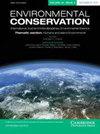Forest loss during 2000–2019 in pygmy hippopotamus (Choeropsis liberiensis) habitats was driven by shifting agriculture
IF 2.6
3区 环境科学与生态学
Q2 BIODIVERSITY CONSERVATION
引用次数: 0
Abstract
Summary The Upper Guinea Forest (UGF; West Africa), a global biodiversity hotspot, has lost more than 90% of its original area since 1900, threatening endemic species such as the endangered pygmy hippopotamus (2000年至2019年期间,倭河马(Choeropsis liberiensis)栖息地的森林损失是由农业转移造成的
上几内亚森林(UGF;西非是全球生物多样性的热点地区,自1900年以来已经失去了90%以上的原始面积,威胁到地方性物种,如濒危的侏儒河马(Choeropsis liberiensis)。然而,人们对这种森林砍伐的直接原因知之甚少。我们使用随机森林算法对Sentinel-2数据进行分类,以区分2000年至2019年期间在侏儒河马分布区推动森林砍伐的三种主要人类过程(农业转移、集约化农业或城市扩张)。在2000年的约89 600平方公里中,15 900平方公里(17%)的森林消失,主要是转移到农业(14 900平方公里)。Côte科特迪瓦和利比里亚占森林净损失面积的14 900平方公里(94%),约为塞拉利昂和几内亚毁林面积总和(953平方公里)的15倍。保护区内的森林损失是普遍存在的,必须优先考虑在森林砍伐率仍然较低的地区(例如Taï、Sapo和Gola雨林国家公园)开展保护工作。我们认为,UGF的保存将面临与人们对粮食和收入的需求相关的挑战。迫切需要持续的景观规模规划和减少森林砍伐的行动,以限制农业转移对侏儒河马栖息地的影响。
本文章由计算机程序翻译,如有差异,请以英文原文为准。
求助全文
约1分钟内获得全文
求助全文
来源期刊

Environmental Conservation
环境科学-环境科学
CiteScore
5.20
自引率
3.70%
发文量
43
审稿时长
>36 weeks
期刊介绍:
Environmental Conservation is one of the longest-standing, most highly-cited of the interdisciplinary environmental science journals. It includes research papers, reports, comments, subject reviews, and book reviews addressing environmental policy, practice, and natural and social science of environmental concern at the global level, informed by rigorous local level case studies. The journal"s scope is very broad, including issues in human institutions, ecosystem change, resource utilisation, terrestrial biomes, aquatic systems, and coastal and land use management. Environmental Conservation is essential reading for all environmentalists, managers, consultants, agency workers and scientists wishing to keep abreast of current developments in environmental science.
 求助内容:
求助内容: 应助结果提醒方式:
应助结果提醒方式:


